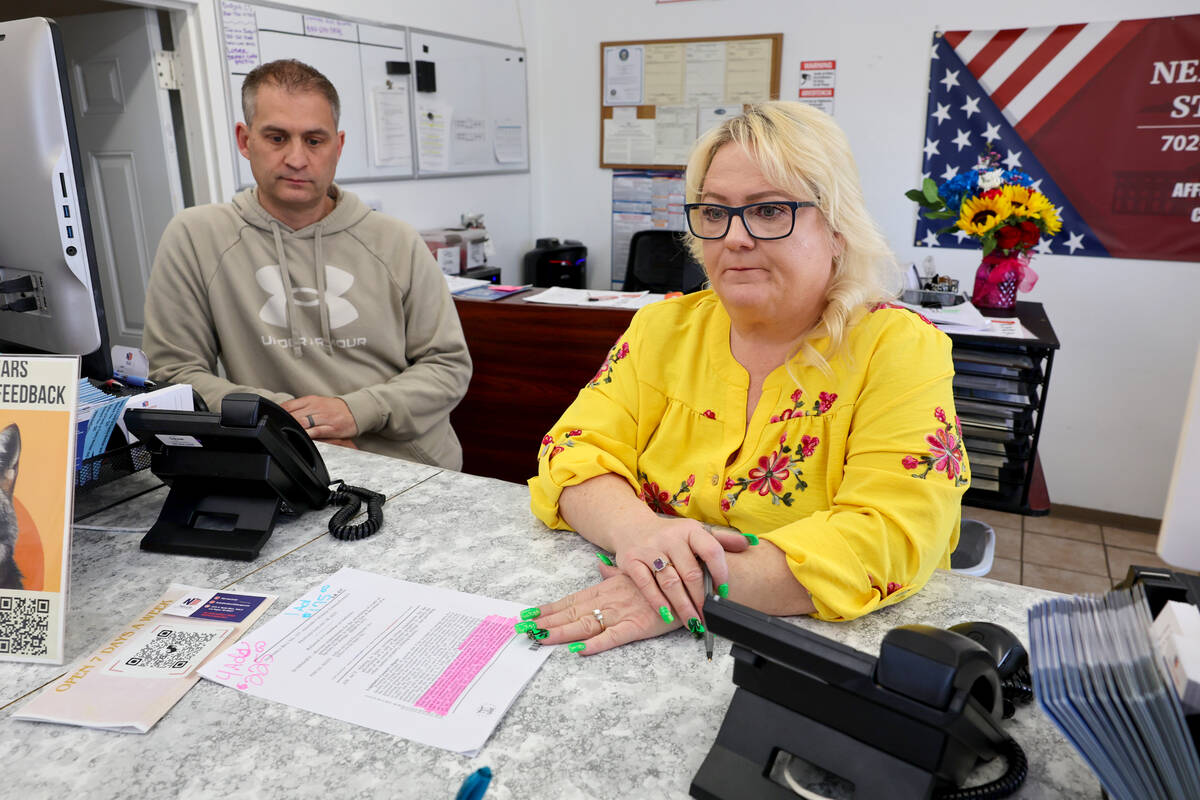Storage wars: Nevada bill would change auction notice process
When Rebecca Breckon stops receiving payments from people who rent units at Nellis Self Storage in Sunrise Manor, a lengthy and costly process ensues to auction off the person’s belongings.
The first day a customer is late with their rent, the property manager of the 500-unit facility begins calling them twice a day. After 15 days, she sends a notice of lien to the renter via certified mail. If the customer still doesn’t pay, Breckon moves to auction it off. The customer’s lock is cut on the 32nd day of late payment.
Under Nevada law, Breckon then has to post legal notices in the newspaper advertising the unit auction — another way of notifying the customer before their belongings are sold. It costs between $175 and $225 to advertise for 14 days, Breckon said. That’s an additional cost after going without rent payments for months, and the money made in an auction is not enough to offset the loss, she said.
A bipartisan bill aims to ease that burden on storage facilities by allowing them to post those auction notices online, though opponents say it will harm transparency and make it more difficult for renters to know when their belongings are about to be sold.
“I’m hoping it’s going to save the owners money, ‘cause we’re a family-owned business, and there’s a lot of big giants around us, so this is very helpful to drop any kind of pricing for us,” Breckon said.
Modernizing 1983 law
Assembly Bill 137 — sponsored by Assemblymembers Selena Torres-Fossett, D-Las Vegas, and Alexis Hansen, R-Sparks — updates a law from 1983 that requires a self-storage facility to post legal notices of auctions in a regional newspaper twice in two weeks.
Only 10 states still require two publications in printed media, according to David Goldwater, a lobbyist for the Self Storage Association who spoke during an Assembly Committee on Judiciary hearing in March. Some states, including Arizona, Maine and Washington, do not require any ads to be posted.
The bill expands options beyond print newspapers, including Facebook Marketplace, Craigslist, Storage Treasures, or a newspaper’s website. The rental agreement between the facility and the renter would outline where the facility will post the notices.
The bill comes at a time when auctions have moved online anyway, according to Kim Siclari, general counsel for Devon Self Storage. Few storage facilities hold in-person auctions, instead opting to use a website like Lockerfox or StorageTreasures, where people can look at pictures of the unit, scan for potential treasure and place bids. Siclari said there’s many attempts to contact the renter before the auction, and the purpose of the advertisement is to get as many bidders as possible.
Torres-Fossett said the bill accommodates changes with newspapers’ decline in readership and moves notices to online, where more people can see it.
“By providing an alternative to newspaper ads, we empower local businesses with greater flexibility while aligning our laws with modern business practices and lowering the burden on the consumer,” she said.
Less transparency?
Both the Nevada Press Association and the Nevada Open Government Coalition, a nonpartisan organization that promotes government accountability through transparency, are against the bill.
They argue a newspaper posting provides oversight in lieu of a judge to keep seizures and auctions from happening in secrecy, and it notifies friends and neighbors when a renter can’t be reached.
Supporters of the bill say that more people read online than a print newspaper, and therefore transparency would be improved.
While acknowledging that the Las Vegas Review-Journal publishes some storage industry legal notices and has a financial interest in the status quo, Executive Editor Glenn Cook said the newspaper industry’s opposition to AB137 is based on its desire for transparency and accountability in the auction process.
“Legal notices provide storage renters with an additional backstop before they lose their property for good, and notices ensure that seizures and auctions can’t be carried out in secret,” Cook said. “There is otherwise no outside oversight of this process — no judicial review, no regulatory approval. Less sunshine is not an improvement.”
Cook said little-known websites cannot match the audience or assurance of newspapers, which remain the “surest, most verifiable way to put important business in front of the taxpaying public.”
Contact Jessica Hill at jehill@reviewjournal.com. Follow @jess_hillyeah on X.




















